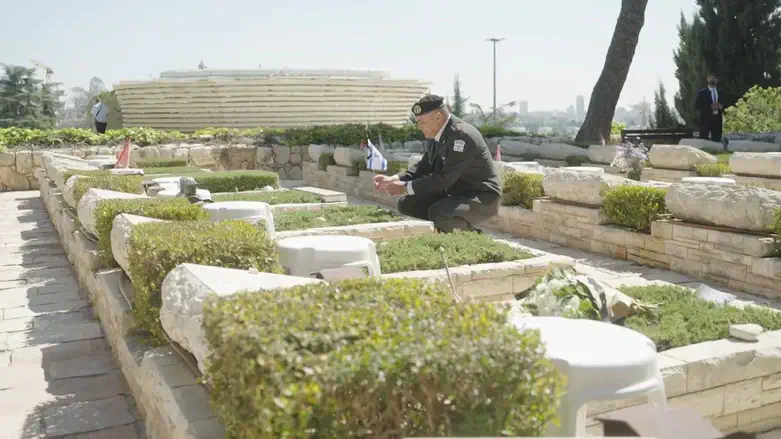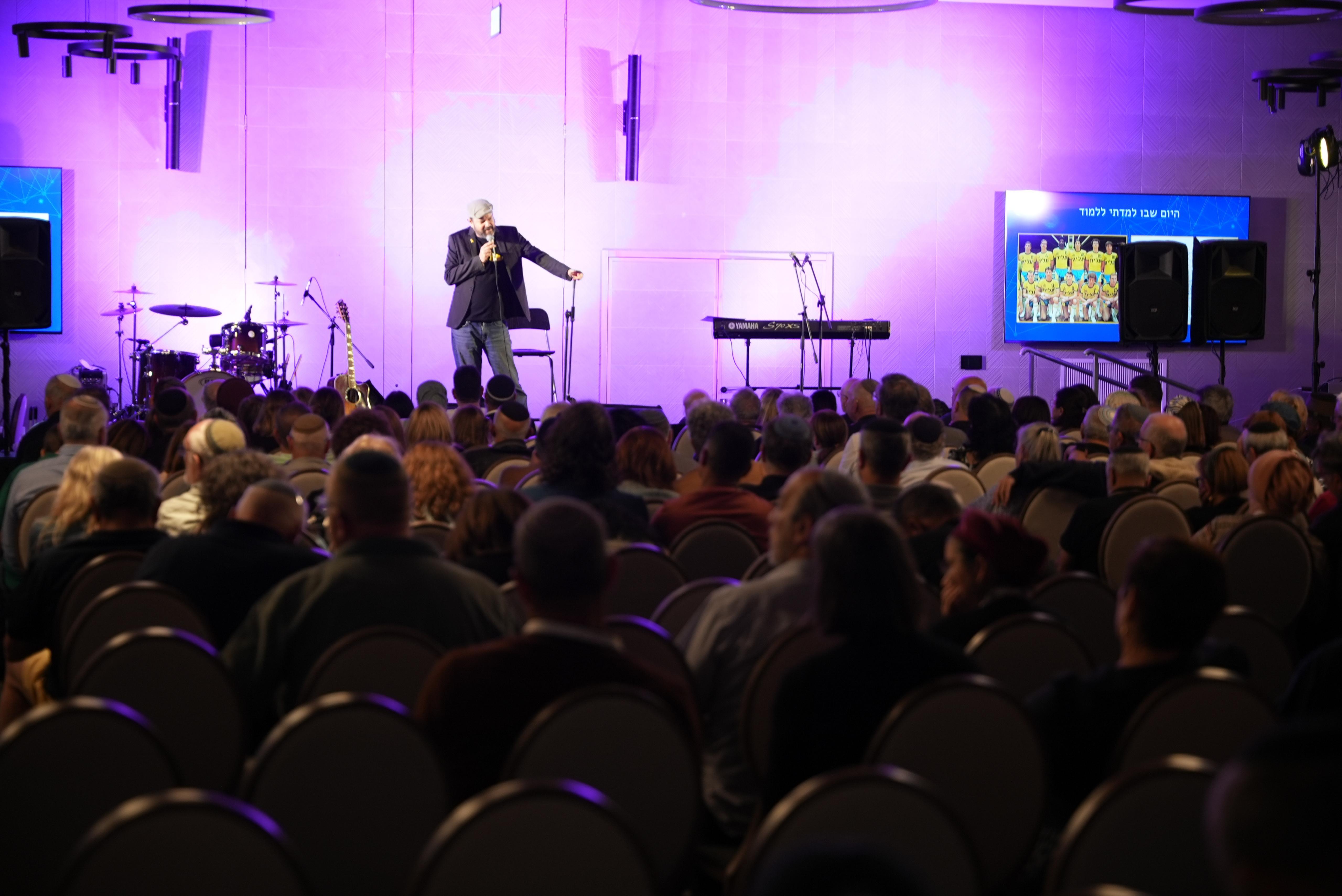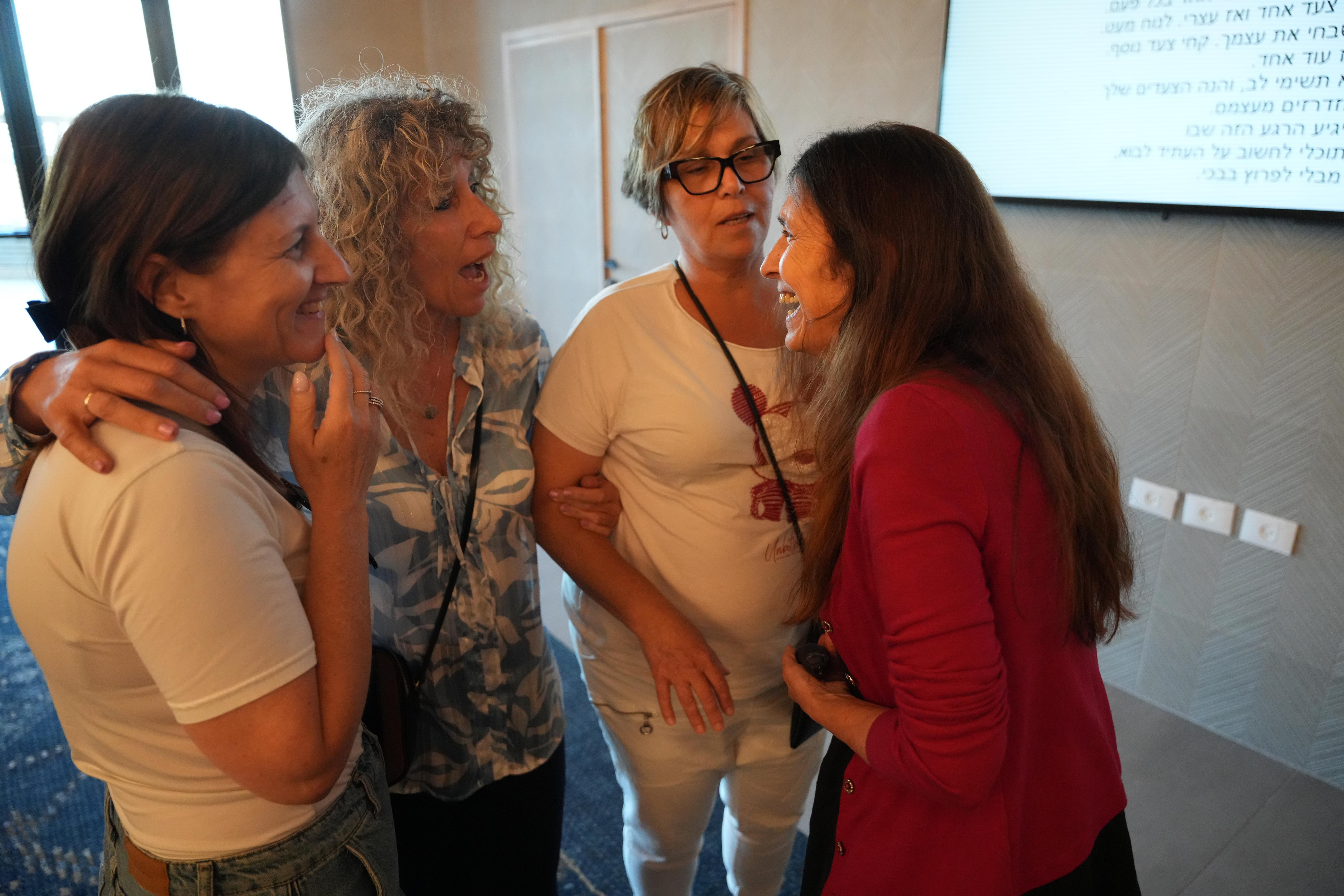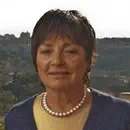
"I thought it would get easier, that I would be back to myself. I know that my beloved son fell while fighting for our land and people in a war against the barbaric enemies who rose up to destroy us. I know he saved many innocent lives. But it seems harder to live with the loss every day. I need someone to give me strength. I need guidance that can give me the courage to continue, and to help me live the rest of my life.”
These words were spoken in a hesitant voice by a well-dressed mother whose matching headscarf was expertly wound around her hair in the style typical of religious Zionist Israeli women, her sad expression a heartrending backdrop to the pleasant and respectful tone in which they were spoken. Joining her were more than twenty mothers of different ages, secular, haredi, religious Zionist – Ashkenazi and Sephardi, sabras and immigrants, forever bound together by their brave soldier sons, most of whom fell in the Iron Swords War during the last year and half.
“We go to work every day, keep house and prepare meals,” they said, “we make every effort to see to it that our homes are happy, especially if there are other children– but inside our souls…inside our hearts…behind our smiles…”

Rabbi Shmuel Eliyahu, Chief Rabbi of Tsfat, who had answered their request for spiritual counseling, knew just what truths to say while tears of empathy shone in his eyes. Eloquently, he made them realize that they are part of a long and unbroken chain of courageous Jewish women since the early days of Jewish history, reminding them of Shifra and Puah who risked their lives to save Jewish infants from Pharaoh, of Queen Esther who endangered her life for her people, of mothers during the many persecutions suffered through the ages of exile, in the Warsaw Ghetto and in the concentration camps. “Now we have our own country and army and can fight back,” he said, “but, as the Haggadah says, they still arise to try to annihilate us in every generation, and you are the real heroines, you are the ones who knew how to raise your sons to love their people and, when called upon, to sacrifice their lives for our nation...”
“Think about a person who donates a kidney,” he comforted. “He has lost that part of himself, he does not have it anymore, but it continues to live on in someone else whose life has been saved by it. Your sons are not with you physically anymore, but they live on forever in the soul of the Jewish people whom they saved.”
The mothers thanked him for his strong message of chizuk (empowerment), and the rabbi was asked to repeat his talk to other mothers, in addition to the scheduled encouraging lecture he gave to all the participants at the OneFamily 3-day retreat for bereaved parents held from April 24-26 at the beautiful David’s Harp hotel on the Kinneret (Sea of Galilee) just before this year’s IDF Memorial Day.

The OneFamily organization founded by Chantal and Marc Belzberg for victims of terror and war in Israel took four hundred bereaved parents, accompanied by a warm, dedicated and efficient staff of professionals and National Service volunteers, away from their regular surroundings to give them an opportunity to enjoy tranquil views of the Kinneret and hills, partake of tasty meals and be strengthened by a variety of carefully planned therapeutic workshops, nature hikes and a pampering visit to the Tiberias thermal springs.


TV personality “The Chaser,” known for his prodigious memory, talked to them about how to organize memories, futurist Leonard Pasek gave a fascinating talk about long term trends in Israel, saying afterwards: “I was afraid that I might cause anxieties to surface instead of helping them. I was happy to see their willingness to leave their pain-filled personal space and visualize the positive prospects for Israel’s future. I was happy to see that cutting them off from the present for a while was a comforting experience for them."

Famous Israeli cantor Israel Parnes led the Ashkenazi Sabbath prayers, Rabbi Eliyahu led the Sephardic service, while other activities were available for participants who were not religious. And when the many fathers who were still saying Kaddish rose to recite the memorial prayer in unison, everyone’s heart skipped a beat.
I, who had come to observe the retreat, found myself sitting with several women who had been my students decades ago, once carefree and blithe spirits, now mothers trying to deal with the loss of their sons.

But I soon realized that there was something beyond the well-chosen program, something intangible in the air, a feeling of camaraderie that filled the atmosphere. Mothers who did not know each other before were sitting in groups talking like old friends, fathers were sharing stories, couples comparing notes – there was noise, there were smiles and heartwarming laughter.
What is happening here? I asked the professional staff.


“Families who are bereaved actually suffer a double crisis at once, the most severe one being that their son has fallen - and that is the worst crisis imaginable”, explained Nomi Mantsur, supervisor of the social worker staff. “But there is another loss that they experience – their surroundings, familiar frameworks, friends, their entire family and social fabric have changed, everything is different than it was, nothing is natural, and they are lost. Meeting one another, spending time with others who feel what they feel, who understand them without words and are not judgmental, is a game-changer, a much-needed release.”
Adi, who works with the bereaved in the southern region of Israel added: “We watch how they allow themselves to laugh when among their partners in loss, to toast one another, enjoy a cup of wine together, do the things they are uncomfortable about in other milieus since the day their sons fell.”
“We see people who came and sat silently suddenly open up, begin to take part in conversations, decide to join a support group," says Bosmat who worked non-stop organizing every detail of the weekend. And Mindy, Batya and Nava, social workers and OneFamily regional coordinators, add: “At the retreat, we offer varied therapeutic choices, from fields such as comedy, literature, music, crafts – parents choose the activities they feel good doing. We also think of details that add a little touch that says that we care – little gifts, t-shirts, and more.”
Avital Taharlev, a psychologist and once my student, whose son was murdered in a terrorist ramming attack while serving in the Golani Brigade, stopped dancing in a circle of women to say simply: “People want to be part of a community, and the community of the bereaved IDF parents has its own special kind of comfort and feeling of belonging. That is the power that a weekend for people who suffer the same black hole in their lives can provide.”

Dina Kit, a bereaved mother herself, who has worked at OneFamily for many years, says that the longterm efficacy and benefits of a retreat organized according to peer groups has been proven and has led the organization to hold events for other groups.”
"Tragically", Chatal Belzberg says, "the war added many names to the roster of those who need retreats, those who need activities, support groups, those who all of us want to pamper and shower with love. We have created groups of young and older bereaved siblings, widows, grandparents, children bereft of one and of two parents, and those whose twin sibling was killed. We are there for all of them.” CEO Moshe Sawil said that this is only one of the OneFamily events taking place over the weekend.
A mother who asked not to reveal her name explained the effect of OneFamily’s work: “The OneFamily coordinator for our region visited us during the shiva. She hugged us saying that ‘we are now one family' and that they are always going to be at our side. She simply kept us going. She is the reason I can get myself out of bed in the morning.”
How does one cope? “Part of the ability to cope depends on expectations,” said clinical social worker and psychotherapist Dr. Etty Avelin, who gave two long sessions during the weekend and was available for questions.


“Life is not over but it will not be the same," she said to the parents. "Don’t worry about the contradictions and swings in your feelings from one day to the next. There is no linear progress, there are no stages of mournng as we once thought, in fact there are emotions that are polar opposites occurring at the same time, hope along with despair. These fractures become part of us and we must not deny them. The Japanese save their broken vessels and keep the cracks and breaks intact."
“Your search for a new life takes place in the dark, you must bravely try to find form within a void, to make both that form and chaos part of your lives, just as G-d created light from amidst darkness and chaos. Instead of progress, there are recurring waves, wave after wave with breaks in between. And the goal is to learn to swim, to surrender to reality and eventually accept it.”
“You have lost your child but not the connection with him. Remember every story, every detail about him, talk about him, record it all. That is what keeps him in your life.”
To a mother’s question, she responded: “Yes, write to him and share your family’s life with him." To another, whose son left a wife and family, she agreed that telling the grandchildren all about him, keeping him alive through memory, is necessary and therapeutic for both teller and listeners.

At the evening Shabbat meal, I sat with Sabine Taasa of Gaza Envelope Kibbutz Netiv Haasara. Sabine is an articulate French immigrant to Israel of many years, whose son was murdered on the Zikim beach on October 7, almost at the same time her husband was killed at their home when he threw himself on top of two of their sons as a terrorist lobbed a grenade at them. The terrorists took a drink of coca cola in the kitchen and she slammed the door of the shelter on them, somehow pushing them away. She now appears all over Europe and the USA, showing the short clip of her son begging the terrorist to kill him and not his father, countering the antisemitic canard about Israel committing genocide. I suddenly realized that I had attended the Bar Mitzva of her son, Koren, organized by OneFamily shortly after the unspeakable horrors she endured and had written about it. We could only hug each other.
Such strength. Such pain.
Perhaps a description of the stellar performance of Israeli songs on Thursday night can serve to do justice to what this weekend retreat brought about and to Israel's bereaved parents.
Veteran singer Moshe Lahav and his talented musicians had the parents singing old favorites, both slow and spirited, with all their might. And then, Moshe asked them for suggestions. Without hesitating, they asked for IDF songs in honor of their sons, and we all sang “My Golani Brigade,” “The Paratrooper’s Song”, “The Navy anthem” and more, our hearts bursting with love, longing and pride for the beautiful young men who paid the supreme price for all of us.
And then, at the evening's end, the resounding notes of the classic oldie “There is no way to turn back anymore” filled the auditorium. This inspiring song tells of the courage, battles and sacrifices that the founding of the Jewish State and its preservation demanded and still demands. The song's last lines are: “We did not stop, we did not tire, we tried for peace and we will yet achieve it here,” and its chorus is: “For good and for bad, there is no way to turn back, there is no way to turn back…”
Am Yisrael Chai.
Rochel Sylvetskymade aliya in 1971 and is Senior Consultant and op-ed and Judaism editor of Arutz Sheva’s English site, a board member at the Knesset Channel and Orot Yisrael Teachers College, and served as chairperson of Emunah Israel from 1991 to 1996. She was CEO/director of Kfar Hanoar Hadati youth village, a member of the Emek Zevulun Regional Council and the Religious Education Council of Israel’s Education Ministry as well as managing editor of Arutz Sheva before her partial retirement. Her degrees are in mathematics and Jewish education. She volunteered at OneFamily for several hours daily from the start of the war.

